DCAA Timekeeping Requirements (+ Best Compliance Tools)

Straight off the bat, here’s a simplified list of the DCAA timekeeping requirements:
| • Everyone in your organization needs to track time. • Employees must record all hours they work. • Employees must log time entries themselves. • Employees need to log time daily in a system. • Employees must specify the tasks they worked on. • Clear submission and approval procedures are critical. • Employee time records must get approved by supervisors. • Team members must get reminded of time tracking guidelines. • Employees must be ready for unannounced floor checks. |
What is the DCAA?
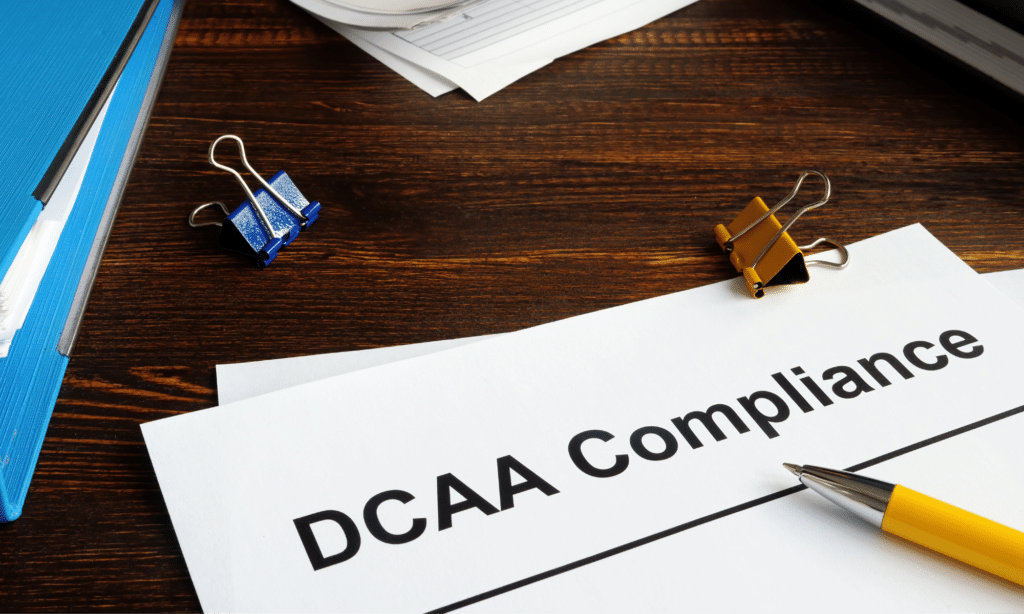
The DCAA (Defense Contract Audit Agency) provides all the audit and financial advisory services to the U.S. Department of Defense (DoD) and other entities responsible for acquisition and contract administration.
This agency operates under the authority of the Under Secretary of Defense.
The DCAA timekeeping requirements are essential to follow.
Importance of Meeting DCAA Requirements
Meeting the DCAA (Defense Contracting Auditing Agency) requirements for timekeeping is crucial for businesses operating in government contracting.
The significance of compliance extends beyond mere adherence to regulations; it plays a pivotal role in preventing fraud and waste, ensuring effective managerial oversight, and fostering successful relationships with government agencies.
1. Goal: Preventing Fraud And Waste
The primary goal of DCAA timekeeping requirements is to prevent fraud and waste in government contracting.
Unlike transactions involving tangible goods or documented services, employee work hours often lack a paper trail.
This makes establishing a robust timekeeping system that accurately records hours worked and serves as a deterrent against fraudulent practices is imperative.
By adhering to DCAA requirements, businesses contribute to the overall integrity of government contracts and reassure stakeholders that taxpayer funds are used responsibly.
2. Significance Of Managerial Oversight and Employee Timekeeping
Managers rely on individual employees to track their work hours, making it essential to have a systematic approach to timekeeping.
The inherent challenge lies in the potential for mistakes or even deliberate fraud by employees.
Adhering to DCAA guidelines ensures businesses establish a transparent and accountable system, allowing managers to oversee and manage employee timekeeping confidently.
3. Contract Acquisition and Maintenance
Government agencies require contractors to demonstrate the quality of their products or services and their commitment to compliance.
Accurate and transparent timekeeping practices are pivotal in showcasing a company’s reliability and integrity, thus enhancing its chances of securing government contracts.
4. Building and Sustaining Relationships with Government Agencies
Adhering to DCAA timekeeping requirements demonstrates a company’s commitment to ethical practices and accountability.
By consistently meeting these requirements, businesses fulfill contractual obligations and establish themselves as trustworthy partners for government agencies.
This can lead to enhanced credibility, repeat business opportunities, and a positive reputation within the government contracting sector.
What is DCAA-compliant Timekeeping? DCAA Requirements for Timekeeping
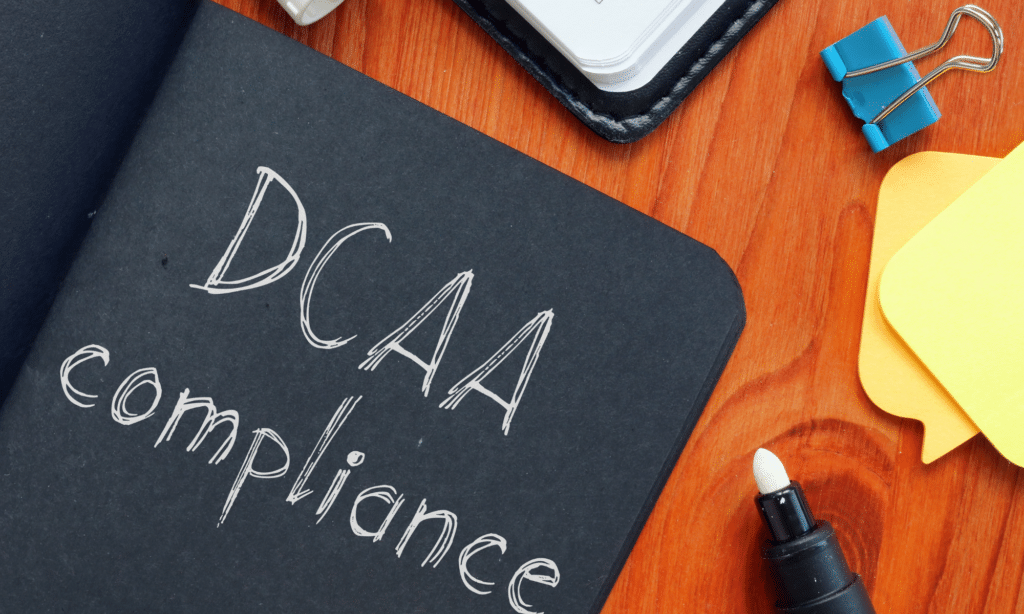
If you obtain a government contract, DCAA compliance is paramount.
The DCAA (Defense Contract Audit Agency) must ensure your company follows the necessary timekeeping and accounting rules.
Following all the DCAA requirements makes it easier for the agency to access your organization accurately.
Closely sticking to the rules is critical.
1. Separation of Employee Work Hours from Other Business Areas
DCAA emphasizes the need for a clear separation between employee work hours and other facets of the business, including payroll.
In traditional business operations, payroll and employee work hours may intertwine, but DCAA mandates a distinct separation.
This is crucial to prevent any potential manipulation or fraudulent activities related to hours worked.
Organizations must implement robust systems that segregate employee work hours from payroll functions to achieve compliance.
This separation serves as a safeguard against unauthorized access and manipulation.
DCAA auditors expect a clear delineation; companies must establish and maintain this separation consistently.
2. Distinction Between Employee Hours and Payroll
Another key requirement involves clearly distinguishing between employee work hours and payroll.
DCAA treats these as separate internal functions.
It’s essential to understand that while payroll management is integral to the business, controlling employee work hours should not reside with those handling payroll.
Organizations should establish and communicate distinct roles and responsibilities for those managing employee work hours and payroll.
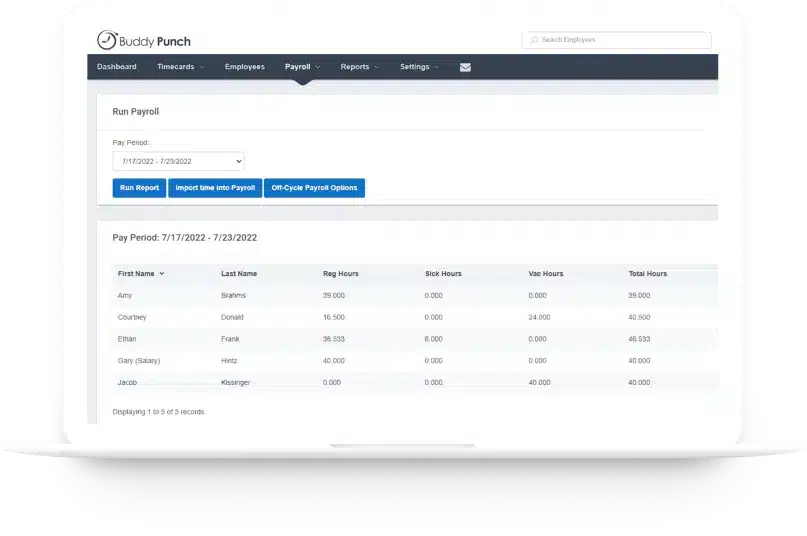
This not only aligns with DCAA regulations but also reinforces the integrity of the timekeeping process.
Companies must adopt a proactive approach to delineate these functions and ensure compliance with DCAA standards.
Try Buddy Punch For Free
3. Control Measures to Prevent Manipulation
DCAA recognizes the potential for manipulation in timekeeping processes and mandates stringent control measures.
The goal is to deter deceptive practices and maintain the accuracy of reported hours.
Companies should implement comprehensive procedures and processes, clearly outlining what is allowed and what is not.
Control measures include regular checks and verifications to ensure adherence to established procedures.
This serves as both a preventive and corrective measure, acting as a deterrent against fraudulent activities.
By consistently monitoring and verifying timekeeping practices, organizations meet DCAA requirements and foster a culture of accountability within the workforce.
What Is Timekeeping Policy?
Timekeeping policy refers to a set of guidelines and procedures established by the Defense Contracting Auditing Agency (DCAA) to regulate and standardize the tracking of employee work hours within companies engaged in government contracting.
The DCAA is unwavering in its commitment to preventing fraud and waste, making adherence to timekeeping policies a critical aspect of contract compliance.
DCAA Timekeeping Procedures
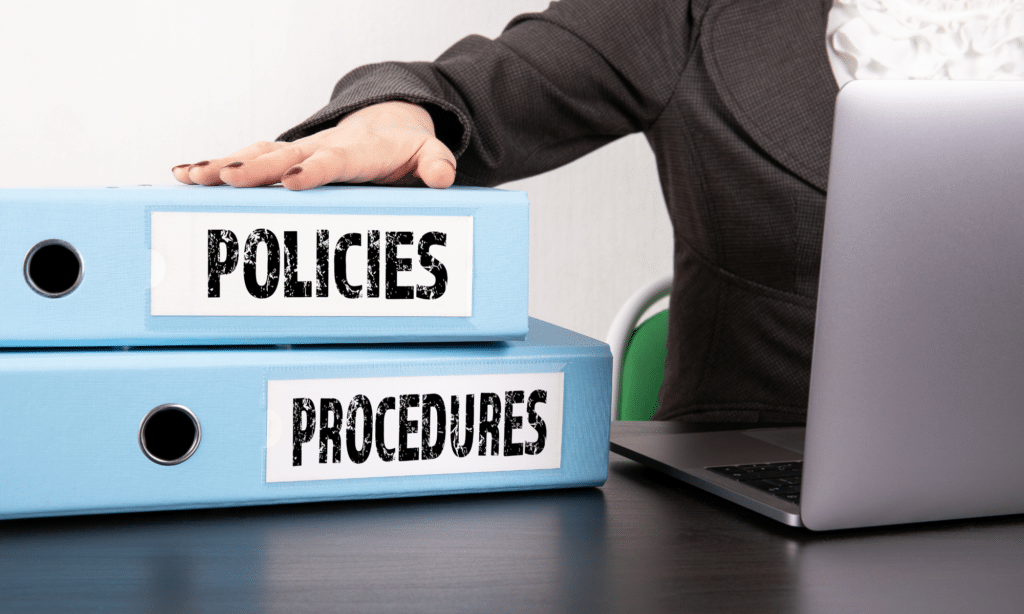
Here are key aspects to consider regarding DCAA timekeeping procedures.
1. Clarity and Understandability
To meet DCAA requirements, it is paramount that timekeeping procedures are transparent and easily understandable for all employees.
Clear communication is crucial in defining what is allowed and not regarding recording work hours.
Employers should establish straightforward guidelines, using language that is easily understandable by all staff members.
2. Maintenance of Procedures and Processes
Consistency is key to maintaining DCAA compliance.
The outlined timekeeping procedures should not be a one-time effort but an ongoing, regularly reviewed, and updated process.
Companies must establish a system to ensure the procedures remain relevant and aligned with any changes in DCAA requirements.
This involves periodic audits and assessments to guarantee that the established processes are in place and effective in practice.
The importance of maintaining procedures is highlighted as a deterrent against deceptive practices.
3. Verification and Checks for Compliance
Companies should implement checks and balances within their procedures to validate the accuracy and compliance of recorded work hours.
This involves a systematic review of timekeeping records, cross-referencing with project timelines, and conducting periodic audits to identify and rectify discrepancies promptly.
Why Is Time Tracking Necessary For DCAA Compliance?
As part of the DCAA timekeeping requirements, time tracking documents are necessary to prove that no time was wasted and no fraud was committed during the work week.
Timesheet collection is an important part of achieving DCAA compliance.
With the right timekeeping system and time tracking software in place, recording time is remarkably easy.
Ready to start a free trial?
No credit card required, all features included.
From timesheet approvals to sick leave, recording time across your organization using an effective electronic timekeeping system daily is easy.
You can configure these systems to align with your timekeeping procedures.
Team leaders can easily track every time entry and monitor labor hours using these tools.
Challenges in Employee Work Hours Tracking
Tracking employee work hours comes with its own challenges, adding complexity to an already vital aspect of compliance.
1. Lack of Paper Trails
Unlike tangible goods or services that leave a paper trail, employee work hours often lack this concrete evidence.
When a company procures items or fulfills contract requirements, there are receipts or documentation to validate the transaction.
However, when it comes to tracking employee work hours, the process is less tangible.
The absence of a traditional paper trail makes it challenging to provide concrete proof of the time invested in contract-related activities.
Without paper documentation, the burden falls on individual employees to accurately record their work hours.
This reliance on human input introduces a level of subjectivity and increases the likelihood of errors or unintentional discrepancies.
It is not uncommon for employees to forget or miscalculate their work hours, leading to inaccuracies that may pose compliance issues with DCAA standards.
2. Reliance on Individual Employees
The responsibility of tracking work hours often rests on the shoulders of individual employees.
While this approach assumes a high level of accountability, it also introduces an element of variability.
Employees may have different interpretations of billable hours or inadvertently neglect to record certain tasks.
The manual nature of timekeeping can be a double-edged sword.
On one hand, it empowers employees to manage their schedules; on the other, it opens the door to potential oversights.
Without a centralized system, enforcing consistent timekeeping practices becomes challenging, and businesses may find it difficult to ensure uniform compliance across the organization.
3. Potential for Mistakes and Fraud
In a system heavily reliant on manual input, the potential for mistakes and, in some cases, intentional fraud increases.
Human error is an inherent risk when employees manually record their work hours.
This is exacerbated by the fact that errors in timekeeping may not be immediately apparent, leading to inaccuracies that can persist unnoticed.
Moreover, the temptation for fraudulent activities exists, albeit in a minority of cases.
Employees or management may be tempted to manipulate recorded hours to meet specific payroll targets or project timelines.
The lack of a robust system to detect and prevent such manipulations can expose organizations to compliance violations and damage their reputation with government agencies.
In addressing these challenges, businesses must explore reliable compliance tools that automate and streamline the timekeeping process.
These tools mitigate the risk of errors and fraud and contribute to a more efficient and transparent workflow, aligning with the stringent requirements set forth by the DCAA.
Best Time Tracking System For Compliance (3 Options)
Following are the top three time tracking apps for small businesses that adhere themselves to DCAA timekeeping requirements.
1. Buddy Punch
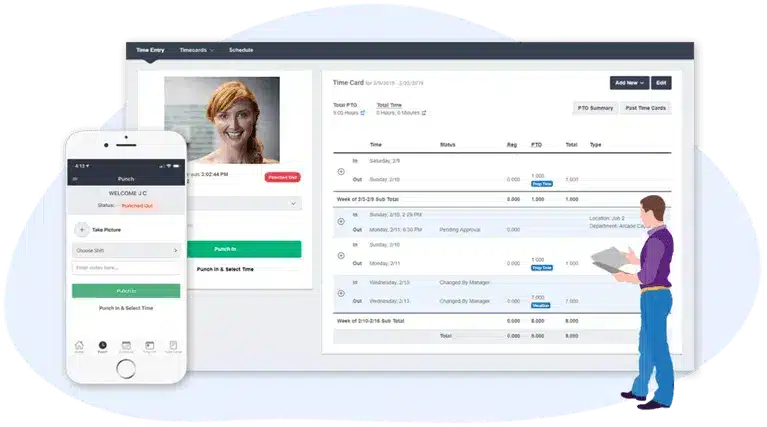
If you are looking for the best timekeeping software for government contractors, look no further than Buddy Punch.
This platform will enable you to establish a clear timekeeping policy and make tracking employee hours (through an electronic system) remarkably easy.
You can also connect Buddy Punch to your go-to accounting system.
When establishing a clear audit trail for your DCAA audit, Buddy Punch will ensure you can collect all the necessary employee timesheet data.
The platform also enables team leaders to track time off and uncompensated overtime.
You can create job codes inside the platform, enabling everyone to see what each team member is working on clearly.
Buddy Punch’s Online Reviews
Buddy Punch’s user reviews highlight the potential benefits of this platform. As of the writing date, Buddy Punch has 4.8 out of 5 stars and 788 reviews on Capterra.

Below, we’ll list just a few reviews that speak to Buddy Punch’s ease of use and great customer support service. (Click here to explore the full list of reviews.)
As reviewers have noted, Buddy Punch provides team leaders and project managers with the necessary tools for accurate time tracking and employee location tracking:
“Easy and convenient to use. I enjoy being able to clock in or out from my desk.”
Click here to read the full review.
“We mainly use Buddy Punch for the time clock feature and use the GPS feature to track where our employees clock in and out since they do so at a remote site. The feature is accurate and is easy to use on our employees’ phones. If there are any issues it is easy for the administrator to log in and correct them.”
Click here to read the full review.
“I love how quickly you can log in to the Buddy Punch site and just simply hit the “Clock In” button. The program is incredibly easy to use and required no training at all, which I really appreciated especially since I’m just a very part-time employee who only uses it once a week.”
Click here to read the full review.
Try Buddy Punch for Free
Try Buddy Punch For Free
If you feel that Buddy Punch might be the right fit for your business, sign up for a free trial. You can also book a one-on-one demo, or view a pre-recorded demo video.
2. Timely
Timely’s automatic time tracking features enable employees to record their attendance and track the hours they work.
With all employee attendance data under one roof, team leaders and project managers can gain a broad understanding of labor costs.
The platform also has project time management tools for tracking progress between projects.
At the time of writing, Timely has a total of 210 reviews on Capterra, with an average of 4.7 out of 5 stars. Timely is loaded with a broad range of high-impact features:
- Automatic Time Tracking
- Project and Team Planning
- Team Time Management
- Project Time Management
- App Integrations
“I liked the way that Timely visually assembled information to be seen en mass. It made the ability to see quickly and easily where time opportunities were for our business.”
Click here to read the full review.
3. QuickBooks Time
If you want to track time across your organization with confidence and ensure compliance with DCAA timekeeping requirements, QuickBooks Time is well-equipped to meet your needs.
Alongside producing time card reports, QuickBooks Time comes with a full range of useful payroll and human resources integrations – so the platform can neatly fit into your workflows.
It’s a great timesheet app for Android and iPhone, and at the time of writing, QuickBooks Time has 4.7 out of 5 stars and 6,190 reviews on Capterra.
QuickBooks Time (formerly TSheets) has features that include but are not limited to:
- Time Tracking
- Staff Scheduling and Messaging
- Time Card Reports
- Payroll and Human Resources Integrations
- Click here to visit QuickBooks Time’s site for all their available features.
“QuickBooks is an efficient and user-friendly tool for automating accounting tasks. It is especially useful for small businesses, as it helps them track hours, bill clients, and generate reports.”
Click here to read the full review.
Try Buddy Punch for Free
Ready to start a free trial?
No credit card required, all features included.
If you feel that Buddy Punch could be the right fit for your business, sign up for a free trial. You can also book a one-on-one demo, or view a pre-recorded demo video.
How Do You Implement DCAA-compliant Timekeeping Into Your Business?
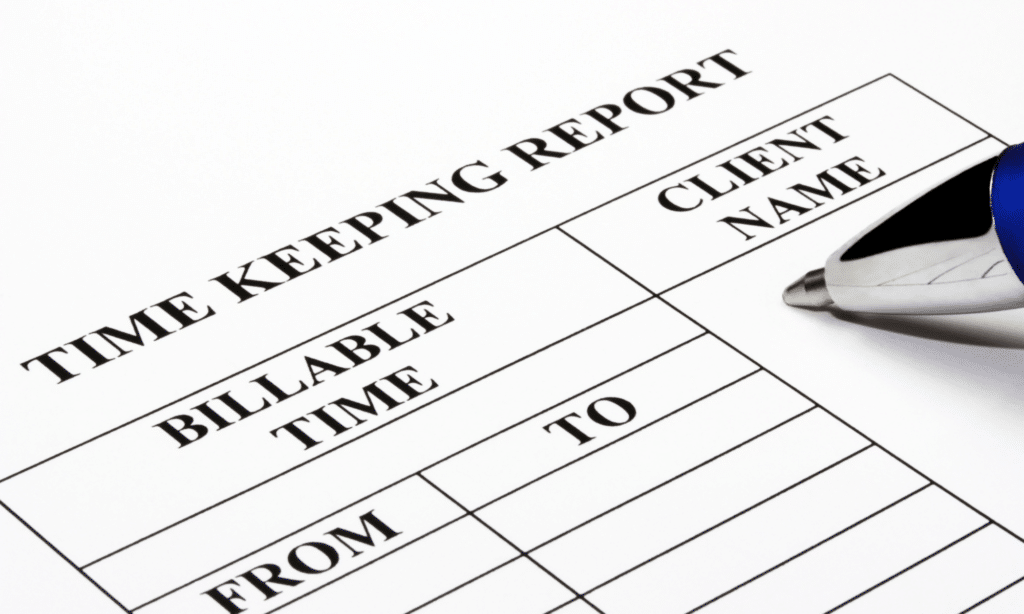
You can follow the steps to implement DCAA compliant timekeeping system into your business successfully.
1. Formulate a Comprehensive Timekeeping Policy
Initiate your compliance journey by establishing a formal timekeeping policy aligned with DCAA requirements.
This policy is a reference guide for your employees and offers DCAA auditors insights into your time tracking system.
2. Ensure Familiarity with Timekeeping Procedures
A crucial element in DCAA compliance is ensuring all personnel are well-acquainted with timekeeping procedures.
Clear, understandable guidelines for employees and supervisors are essential, especially considering the possibility of DCAA representatives questioning any employee during an audit.
3. Implement Daily Time Tracking
Encourage employees to diligently track their daily time, encompassing unpaid hours, overtime, and paid time off.
Given the advantages of digital solutions, consider utilizing time tracking software like Buddy Punch for efficiency, accuracy, and real-time tracking across multiple devices.
4. Leverage Buddy Punch’s Time Tracking Features
Buddy Punch offers features such as timesheet reminders and timesheet approval to prevent unauthorized alterations to time records.
Supervisors should refrain from logging time on behalf of employees, except in specific situations, such as timekeeping for sick leave or business trips.
5. Streamline Labor Cost Calculations
DCAA places significance on accurate labor cost calculations based on hours worked.
With Buddy Punch, defining hourly rates for each employee allows for automated labor cost calculations.
Record all overtime, irrespective of employees’ pay structures, to ensure precise labor cost evaluation.
6. Record Paid Time Off and Enhance Project Tracking
Thoroughly record paid time off, including national holidays, sick leave, vacation, personal time, family and parental leave, and bereavement pay.
DCAA mandates precise reporting of work-related time, requiring companies to specify the task and project for each employee’s work hours. Utilize Buddy Punch’s project and task features to enhance organization and compliance.
7. Track and Document Changes
Maintaining an audit trail of changes in time tracking data is crucial for DCAA scrutiny.
Buddy Punch’s locked timesheet features facilitate comprehensive tracking of modifications, providing transparency into why changes were made.
8. Ensure Employee Sign-offs and Supervisory Approval
Require employees to sign off on their time entries personally.
Supervisors are pivotal in reviewing and approving weekly timesheets in detailed reports.
Once approved, timesheets become immutable, barring further edits.
In cases of errors, employees can submit additional time entries for approval, or administrators can withdraw approval with a traceable audit log.
9. Segregate Timekeeping from Payroll Functions
Maintain a clear separation between timekeeping and payroll responsibilities to ensure smooth labor distribution and efficient payroll processes.
After monthly time tracking, managers can request summary reports from employees, supporting the allocation of resources and indirect costs.
These reports, when received, play a crucial role in budgeting, allowing for a detailed examination of project costs and ensuring compliance with accounting standards.
Employing compliant timekeeping software to facilitate accurate data collection and adhere to regulatory requirements is imperative.
The use of compliant timekeeping software not only streamlines labor distribution but also enhances the overall integrity of payroll processes.
In addition, integrating labor distribution notifications within the time tracking system can serve as a proactive measure.
These notifications can alert relevant stakeholders about discrepancies or deviations from the allocated budgets, enabling swift corrective actions.
A compliant timekeeping software with embedded labor distribution notifications ensures that the project stays within budget constraints and meets the necessary compliance standards.
This level of integration provides a comprehensive solution, linking project costs, general ledger entries, and accounting software for a cohesive and transparent financial management process.
10. Enhance Security Measures
Emphasize secure practices for employees managing their accounts on time tracking software.
DCAA recommends password changes every six months for enhanced data security.
Consider Buddy Punch’s single sign-on (SSO) feature for additional security measures.
You May Also Like…
